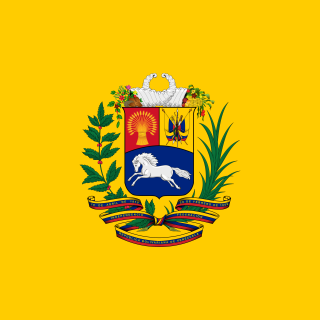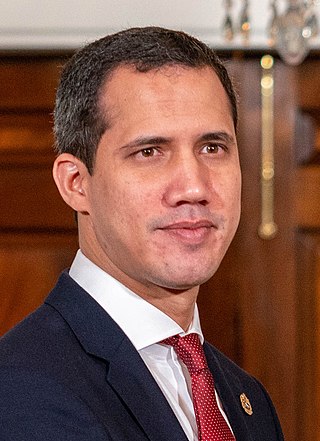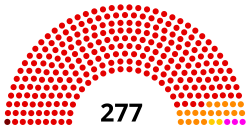
The politics of Venezuela occurs in a framework explained in Government of Venezuela.

The Supreme Justice Tribunal is the highest court of law in the Bolivarian Republic of Venezuela and is the head of the judicial branch. As the independence of the Venezuelan judiciary under the regime of Nicolás Maduro is questioned, there have recently been many disputes as to whether this court is legitimate.

Elections in Venezuela are held at a national level for the President of Venezuela as head of state and head of government, and for a unicameral legislature. The President of Venezuela is elected for a six-year term by direct election plurality voting, and is eligible for re-election. The National Assembly (Asamblea Nacional) has 165 members (diputados), elected for five-year terms using a mixed-member majoritarian representation system. Elections also take place at state level and local level.

The president of Venezuela, officially known as the President of the Bolivarian Republic of Venezuela, is the head of state and head of government in Venezuela. The president leads the National Executive of the Venezuelan government and is the commander-in-chief of the National Bolivarian Armed Forces. Presidential terms were set at six years with the adoption of the 1999 Constitution of Venezuela, and presidential term limits were removed in 2009.

Nicolás Maduro Moros is a Venezuelan politician who has served as the president of Venezuela since 2013.

The president of the National Assembly is the presiding officer (speaker) of the National Assembly, Venezuela's unicameral legislature. The president's term coincides with the term of the legislature. The post has existed since the election of the first National Assembly in 2000. Before the creation of the National Assembly with the adoption of the 1999 constitution, the country's legislature was the bicameral Congress, which contained the Senate and the Chamber of Deputies. The last president of the Senate was Luis Alfonso Dávila, and the last president of the Chamber of Deputies was Henrique Capriles Radonski.

On 29 March 2017, the Supreme Tribunal of Justice (TSJ) of Venezuela took over legislative powers of the National Assembly. The Tribunal, mainly supporters of President Nicolás Maduro, also restricted the immunity granted to the Assembly's members, who mostly belonged to the opposition.

Constituent Assembly elections were held in Venezuela on 30 July 2017 to elect the members of the 2017 Constituent National Assembly. Unlike the 1999 Constituent National Assembly, which was assembled following a referendum, the 2017 election was convened by the presidential decree of President Nicolás Maduro. Smartmatic, the Venezuelan-owned company which provided the voting machines, stated that the results were tampered with by the CNE, and that the turnout was off by at least one million votes.

The Constituent National Assembly was a constituent assembly elected in 2017 to draft a new constitution for Venezuela. Its members were elected in a special 2017 election that was condemned by over forty mostly Latin American and Western states. The Democratic Unity Roundtable—the opposition to the incumbent ruling party—also boycotted the election claiming that the Constituent Assembly was "a trick to keep [the incumbent ruling party] in power." Since the opposition did not participate in the election, the incumbent Great Patriotic Pole, dominated by the United Socialist Party of Venezuela, won almost all seats in the assembly by default.

Freddy Guevara is a Venezuelan political leader with a major in Communication from Andrés Bello Catholic University and a graduate certificate in Public Policy. He was elected Deputy to the Venezuelan National Assembly for Circuit 2 of the Miranda State representing the Democratic Unity Roundtable in the parliamentary elections of December 6, 2015. A key figure of the opposition to controversial Venezuelan President Nicolás Maduro, Guevara was arrested in July 2021 for crimes against the state, although the United States and others condemned the arrest as politically-motivated; in mid-August, he was freed as part of negotiations between the Maduro government and the Venezuelan opposition.
Parliamentary elections were held in Venezuela on 6 December 2020. Aside from the 167 deputies of the National Assembly who are eligible to be re-elected, the new National Electoral Council president announced that the assembly would increase by 110 seats, for a total of 277 deputies to be elected.

Juan Gerardo Guaidó Márquez is a Venezuelan opposition politician. He belonged to the social-democratic party Popular Will, and was a federal deputy to the National Assembly representing the state of Vargas. On 23 January 2019, Guaidó and the National Assembly declared that he was acting president of Venezuela, starting the Venezuelan presidential crisis by challenging Nicolás Maduro's presidency. In December 2022, opposition parties voted to dismiss Guaidó as interim president, choosing Dinorah Figuera as a successor on 5 January 2023 and ending Guaidó's presidential claim.

The second inauguration of Nicolás Maduro as President of Venezuela took place on Thursday, 10 January 2019. The inauguration involved the swearing-in of Nicolás Maduro for his second term, and, especially within the context of Maduro's election, has been controversial and contested by various figures and organizations.

The Venezuelan presidential crisis was a political crisis concerning the leadership and the legitimate president of Venezuela between 2019 and 2023, with the nation and the world divided in support for Nicolás Maduro or Juan Guaidó.
The Statute Governing the Transition to Democracy to Re-establish the Validity of the Constitution of the Bolivarian Republic of Venezuela is a statute adopted by the Venezuelan National Assembly that defines the "duration of a transition government and its political and economic responsibilities". Approved on 5 February 2019, through its seven chapters and thirty-nine articles, the Transition Statute "governs the installation of a provisional Government and the convocation of free elections", and "establishes the election of new rectors of the National Electoral Council, new magistrates of the Supreme Tribunal of Justice and new representatives of the Citizen Power." It also establishes that – in the absence of a constitutionally elected president – the National Assembly President is the Acting President of Venezuela.
The 2020 Venezuelan National Assembly Delegated Committee election was to be held in the ordinary session of the National Assembly on 5 January, in which 160 deputies were to elect the legislature's board of directors for the year 2020–21: the president, the first and second vice presidents, the secretary and the deputy secretary. It was the last such election of the IV National Assembly.

Luis Eduardo Parra Rivero is a Venezuelan politician who was in a dispute with Juan Guaidó for a year over who was the President of the National Assembly of Venezuela based on a vote on 5 January 2020.

Operación Alacrán, also known as CLAP affair or PSUV-CLAP faction, is the name given to a corruption plot which was denounced in 2019 by the members of the National Assembly of Venezuela. It would have sought to avoid the re-election of Juan Guaidó on 5 January 2020 as President of the Assembly, by obtaining the support of opposing legislators in exchange for millions of dollars. Legislators would have been asked to vote against Guaidó, or to not attend the election and thereby break the necessary quorum.
Elvis Eduardo Hidrobo Amoroso is a Venezuelan politician and lawyer who currently serves as the Comptroller General of Venezuela as of 23 October 2018. He also holds the presidency of the Republican Moral Council, also known as the Moral Power. In August 2017, he was elected as first and second vice president of the 2017 Constituent National Assembly and served until October 2017. He also served as a deputy to the National Assembly for the United Socialist Party of Venezuela (PSUV).














































